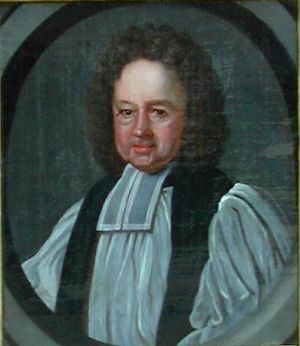Thomas Sherlock
| The Rt Revd and Rt Hon Thomas Sherlock |
|
|---|---|
| Bishop of London | |
 |
|
| Church | Church of England |
| Diocese | Diocese of London |
| Elected | 1748 |
| Term ended | 1761 (death) |
| Predecessor | Edmund Gibson |
| Successor | Thomas Hayter |
| Other posts | Bishop of Salisbury 1734–1748 Bishop of Bangor 1728–1734 |
| Orders | |
| Consecration | c. 1728 |
| Personal details | |
| Born | 1678 London |
| Died | 18 July 1761 |
| Buried | All Saints Church, Fulham, Middlesex |
| Nationality | British |
| Denomination | Anglican |
| Parents | William Sherlock |
| Profession | Academic |
| Alma mater | St Catharine's College, Cambridge (MA, DD) |
Thomas Sherlock (1678 – 18 July 1761) was a British divine who served as a Church of England bishop for 33 years. He is also noted in church history as an important contributor to Christian apologetics.
Life
Born in London, he was the son of the Very Revd William Sherlock, Dean of St Paul's. He was educated at Eton College and St Catharine's College, Cambridge.[1] In 1704 he succeeded his father as Master of the Temple, where he was very popular.
Sherlock died in 1761 and is buried in the churchyard of All Saints Church, Fulham, Middlesex.
Career
In 1714 he became master of his old college at Cambridge and later the university's vice-chancellor, whose privileges he defended against Richard Bentley. In 1715, he was appointed Dean of Chichester.
He took a prominent part in the Bangorian controversy against Benjamin Hoadly. Sherlock became Bishop of Bangor in 1728; he was afterwards translated to Salisbury in 1734 and then to London in 1748, when he was sworn of the Privy Council. Sherlock was a capable administrator and cultivated friendly relations with Dissenters. In Parliament he gave good service to his old schoolfellow, Robert Walpole, Prime Minister of the United Kingdom.
Writings
He published against Anthony Collins's deistic Grounds of the Christian Religion a volume of sermons entitled The Use and Intent of Prophecy in the Several Ages of the World (1725); and in reply to Thomas Woolston's Discourses on the Miracles he wrote a volume entitled The Tryal of the Witnesses of the Resurrection of Jesus (1729), which soon ran through fourteen editions. His Pastoral Letter (1750) on the late earthquakes had a circulation of many thousands, and four or five volumes of Sermons which he published in his later years (1754–1758) were also at one time highly esteemed.
A collected edition of his works, with a memoir, in five volumes, by Thomas Smart Hughes, appeared in 1830.
Sherlock's Tryal of the Witnesses is generally understood by scholars such as Edward Carpenter, Colin Brown and William Lane Craig, to be a work that the Scottish philosopher David Hume probably had read and to which Hume offered a counter viewpoint in his empiricist arguments against the possibility of miracles.
Apologetics
Since the Deist controversy Sherlock's argument for the evidences of the resurrection of Jesus Christ has continued to interest later Christian apologists such as William Lane Craig and John Warwick Montgomery. His place in the history of apologetics has been classified by Ross Clifford as belonging to the legal or juridical school of Christian apologetics.
References
- ↑ Lua error in package.lua at line 80: module 'strict' not found.
 This article incorporates text from a publication now in the public domain: Lua error in package.lua at line 80: module 'strict' not found.
This article incorporates text from a publication now in the public domain: Lua error in package.lua at line 80: module 'strict' not found.
Further reading
- Colin Brown, Miracles and the Critical Mind, (Exeter: Paternoster/Grand Rapids: William B. Eerdmans Publishing Co., 1984). ISBN 0-8028-3590-2
- Edward Carpenter, Thomas Sherlock 1678-1761, (London: SPCK, 1936).
- Ross Clifford, John Warwick Montgomery's Legal Apologetic: An Apologetic for All Seasons, (Bonn: Verlag fur kultur und Wissenschaft, 2004). ISBN 3-938116-00-5
- William Lane Craig, The Historical Argument for the Rsurrection of Jesus During the Deist Controversy, (Lewiston & Queenston: Edwin Mellen Press, 1985). ISBN 0-88946-811-7
External links
- Works by Thomas Sherlock at Project Gutenberg
- Lua error in Module:Internet_Archive at line 573: attempt to index field 'wikibase' (a nil value).
- Archival material relating to Thomas Sherlock listed at the UK National Archives
| Academic offices | ||
|---|---|---|
| Preceded by | Vice-Chancellor of the University of Cambridge 1714-5 |
Succeeded by Daniel Waterland |
| Preceded by | Master of St Catharine's College, Cambridge 1714–1719 |
Succeeded by Thomas Crosse |
| Church of England titles | ||
| Preceded by | Bishop of Bangor 1728–1734 |
Succeeded by Charles Cecil |
| Preceded by | Bishop of Salisbury 1734–1748 |
Succeeded by John Gilbert |
| Preceded by | Bishop of London 1748–1761 |
Succeeded by Thomas Hayter |
Lua error in package.lua at line 80: module 'strict' not found.
- Wikipedia articles incorporating a citation from the 1911 Encyclopaedia Britannica with no article parameter
- Articles with Internet Archive links
- Use dmy dates from December 2014
- Use British English from December 2014
- 1678 births
- 1761 deaths
- People educated at Eton College
- Alumni of St Catharine's College, Cambridge
- Bishops of Bangor
- Bishops of London
- Bishops of Salisbury
- Chancellors of the College of William & Mary
- Members of the Privy Council of Great Britain
- Writers from London
- Masters of St Catharine's College, Cambridge
- English sermon writers
- Deans of Chichester
- 18th-century Anglican bishops
- Vice-Chancellors of the University of Cambridge

